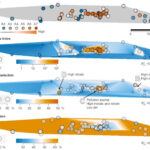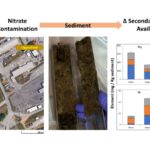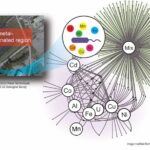 University of Georgia
University of Georgia
Principal Investigator
adamsm@uga.edu
(706) 540-1645
Michael Adams is a Principal Investigator, whose primary research interests are the metabolism of metals and their assimilation into metalloproteins. His laboratory conducts elemental analyses (53 metals) of environmental samples and is developing methods for high throughput characterization of metalloproteins in microbial biomass. His team supplies isolates and data to downstream efforts in the Environmental Atlas and Environmental Simulation aims.
Our overall goal is to discover metal-based molecular mechanisms that either enable biological processes to occur (e.g. denitrification and DNRA) or enable microbes to resist metal toxicity. We will enrich, isolate and characterize new strains of individual microorganisms and microbial communities from groundwater, sediment, and bioreactors. We will determine the molecular mechanisms of these metal-related stresses through trace metal analyses, enzyme assays, high-throughput enrichment techniques, advanced mutant fitness and metabolomics techniques, and protein characterization. The overall goal is to determine the mechanisms by which individual genes provide a competitive advantage relative to other community members in ORR environments. This laboratory work will be guided by our ongoing work as part of the environmental (field) analysis team, in which we provide trace metal analysis (ICP-MS) on hundreds of groundwater and sediment samples each year. In addition, we will continue to provide metal-based analyses and technical knowledge to other ENIGMA researchers per their requests.
Our work will be focused on detailed phenotypic and genetic characterization of the selected strains from the Sub Surface Observatory (SSO) experiment. We will enrich for tungsten-utilizing, archaea, and/or metal-resistant microbes. We will examine the pH range, carbon source preference, and resistance to and preference for different metals in the selected temporal strains. Using various growth conditions, we will examine how the strains accumulated different metals in their cytoplasmic or membrane fractions as measured by trace metal analysis. With ENIGMA collaborators, we will examine genome sequences and perform targeted transcription studies to predict metal-related regulatory pathways. In addition, we will perform trace metal analysis of samples from collaborators working on environmental (field) and bioreactor samples.
Relevant Publications
 Goff Uses KBase to Analyze Genetic Factors Impacting Microbial Fitness in Contaminated Environments - A recent KBase community highlight summarized research accomplishments from Jennifer Goff, who was a postdoctoral researcher with the ENIGMA Science Focus Area in Mike Adams' lab at the University of Georgia (UGA) and is now a professor at SUNY College of Environmental Science and Forestry (ESF). Several of her team’s latest studies, which used KBase to conduct large-scale genetic analyses,… More →
Goff Uses KBase to Analyze Genetic Factors Impacting Microbial Fitness in Contaminated Environments - A recent KBase community highlight summarized research accomplishments from Jennifer Goff, who was a postdoctoral researcher with the ENIGMA Science Focus Area in Mike Adams' lab at the University of Georgia (UGA) and is now a professor at SUNY College of Environmental Science and Forestry (ESF). Several of her team’s latest studies, which used KBase to conduct large-scale genetic analyses,… More → Multi-disciplinary research develops a deeper understanding of subsurface microbiology - ENIGMA is organized into three aims that reflect the different research scales (i.e., field level to molecular level) required to build a comprehensive picture of subsurface microbiology at the Oak Ridge Reservation (ORR): Subsurface Observatory, Environmental Atlas, and Environmental Simulations. Several key research initiatives, described in this cross-aim overview, highlight this framework in action. More →
Multi-disciplinary research develops a deeper understanding of subsurface microbiology - ENIGMA is organized into three aims that reflect the different research scales (i.e., field level to molecular level) required to build a comprehensive picture of subsurface microbiology at the Oak Ridge Reservation (ORR): Subsurface Observatory, Environmental Atlas, and Environmental Simulations. Several key research initiatives, described in this cross-aim overview, highlight this framework in action. More → Nuclear Waste Sites Yield Microbial Ecosystem Insights - In a flagship seven-year study, published this January in the journal Nature Microbiology, ENIGMA researchers explored how environmental stresses influence the composition and structure of microbial communities in the groundwater of the Oak Ridge Reservation (ORR), a former nuclear waste disposal site. More →
Nuclear Waste Sites Yield Microbial Ecosystem Insights - In a flagship seven-year study, published this January in the journal Nature Microbiology, ENIGMA researchers explored how environmental stresses influence the composition and structure of microbial communities in the groundwater of the Oak Ridge Reservation (ORR), a former nuclear waste disposal site. More → Mixed Nitrate and Metal Contamination Influences Operational Speciation of Toxic and Essential Elements - ENIGMA researchers compared the availability of elements in non-contaminated and acidic nitrate contaminated sediment and found that contamination impacted the bioavailability of essential elements. More →
Mixed Nitrate and Metal Contamination Influences Operational Speciation of Toxic and Essential Elements - ENIGMA researchers compared the availability of elements in non-contaminated and acidic nitrate contaminated sediment and found that contamination impacted the bioavailability of essential elements. More → Metal Contamination Causes Metabolic Stress in Environmental Bacteria - ENIGMA researchers at Lawrence Berkeley National Laboratory and University of Georgia discovered that mixed metal waste common to industrial dumping sites causes a distinctive physiological response in bacteria that does not occur during single metal exposure. More →
Metal Contamination Causes Metabolic Stress in Environmental Bacteria - ENIGMA researchers at Lawrence Berkeley National Laboratory and University of Georgia discovered that mixed metal waste common to industrial dumping sites causes a distinctive physiological response in bacteria that does not occur during single metal exposure. More → ENIGMA researchers awarded for First Place Talks - University of Georgia ENIGMA researchers Jennifer Goff (postdoctoral fellow) and Elizabeth Szink (undergraduate research associate) presented their work at the 10th Annual Southeastern Biogeochemistry Symposium May 12-14,2023 at the University of South Carolina, Columbia, SC . The Southeastern Biogeochemistry Symposium is a unique opportunity for undergraduate students, graduate students, post doctorate, and faculty members from the southeast to convene and present… More →
ENIGMA researchers awarded for First Place Talks - University of Georgia ENIGMA researchers Jennifer Goff (postdoctoral fellow) and Elizabeth Szink (undergraduate research associate) presented their work at the 10th Annual Southeastern Biogeochemistry Symposium May 12-14,2023 at the University of South Carolina, Columbia, SC . The Southeastern Biogeochemistry Symposium is a unique opportunity for undergraduate students, graduate students, post doctorate, and faculty members from the southeast to convene and present… More →